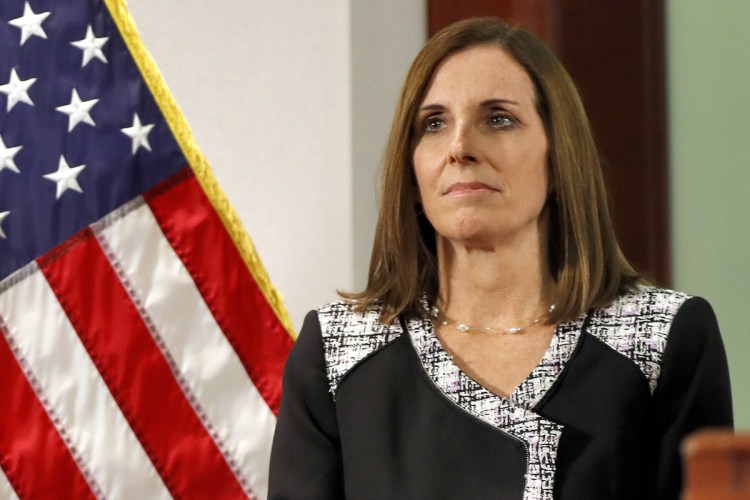Last December, I asked a question related to Martha McSally as she was about to fill the Senate seat left vacant by the late John McCain: “What more could you want in a senator?”
Having known McSally during her two terms in the House of Representatives, I was impressed with her spunk and courage, as demonstrated during her 26 years in the Air Force, where she was a squadron commander and the nation’s first female fighter pilot to fly combat missions. I’ve also admired her humility, warmth and, of course, love of dogs. Don’t laugh. “Must Love Dogs” isn’t just a romantic comedy. It’s the password to my personal universe.
Now we also know that McSally is a rape victim, though the word “victim” doesn’t suit her. Indeed, at a Senate Armed Services Committee hearing last Wednesday, where she told her story, McSally referred to herself as a “military sexual-assault survivor.” She wasn’t always able to say that. For years, she told no one about the rape and suffered in silence, as so many assault victims do. McSally told the committee that she felt ashamed, confused and embarrassed, and she blamed herself. Again, as so many victims do. She didn’t trust the system, she said.
If you caught McSally at the televised hearing, or in subsequent news clips, you may have seen what I did – a woman of strength, self-control, resolve and determination, despite visible emotion and apparent deep pain. She’s a maverick’s maverick, I thought, and one tough cookie. Though she remained composed, one could see McSally struggle as she recounted being raped by a superior officer and then, in her words, being raped again, figuratively, when she eventually reported the assault to the Air Force. The system victimized her again, she said, treating her as though she were a perpetrator rather than someone who had been violated. Such was her despair that McSally considered packing her duffel bag and leaving the military.
“But I didn’t quit,” she said. “I decided to stay and continue to serve and fight and lead. To be a voice from within the ranks for women – and then in the House and now the Senate.”
We’ve heard stories like McSally’s too many times. Until relatively recently, many women had been afraid to speak up lest they not be believed. Others feared the stigma of rape. A close friend of mine who was sexually assaulted at knifepoint in her own home said she refused to prosecute her assailant when he was captured because she didn’t want to be known as a rape victim. She imagined that, no matter whatever else she might do or become, the first thing people would say about her was, “Oh, there’s so-and-so. She was raped, you know.”
Though we’ve come a long way since the time when McSally was attacked, there’s still much to be done, both in civilian and military life. McSally said she decided to tell her story to the world in hopes of further advancing necessary changes.
The military is unique in obvious ways, making sexual assault not just a personal issue but one of national security. Teamwork and morale, which are so critical to military effectiveness, can’t possibly be maintained if female (and some male) troops live in fear of rape. Even one assaulted person would undermine troop cohesion – and word gets around. In McSally’s case, circumstances were even worse given the power differential between her and her superior officer. She not only suffered a breach of trust but became his psychological captive.
McSally soldiered on, despite suffering self-doubt and, surely, fear. One can only imagine the horror of essentially being held hostage to a predator who also has power over your future. Meanwhile, lives are at stake. What if you knew your wingman had been raped by your commanding officer?
Grit, it seems, is McSally’s wingman. In an interview last Friday with CBS’ Norah O’Donnell, McSally said she decided to become a fighter pilot as soon as she learned that women weren’t allowed. “It just pissed me off,” she recounted. “And I said, ‘That’s exactly what I’m gonna do.’ And I walked around saying, ‘I’m gonna be the first woman fighter pilot.’ … I knew nothing about flying, but I was mostly driven because they told me that I couldn’t.”
Nothing was going to stop her, apparently, including a superior officer who tried to destroy her through the ultimate means of domination. I suspect McCain would have been proud of the woman who took his place.
Kathleen Parker is a columnist for The Washington Post. She can be contacted at:
Send questions/comments to the editors.


